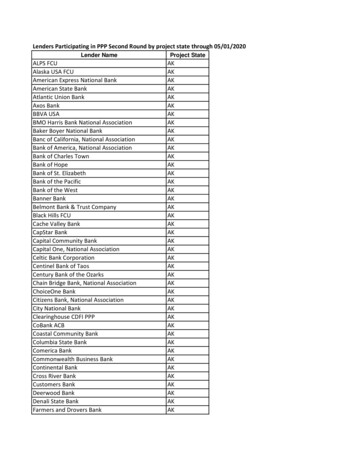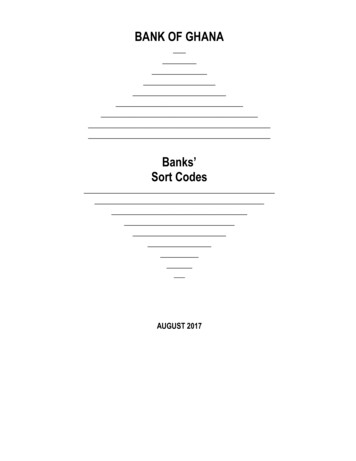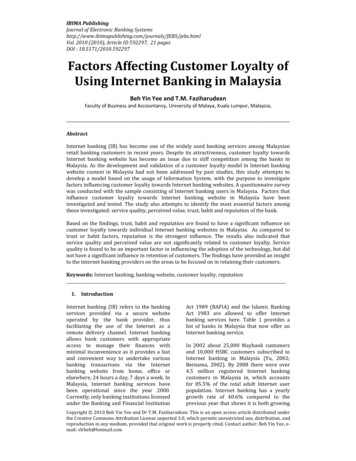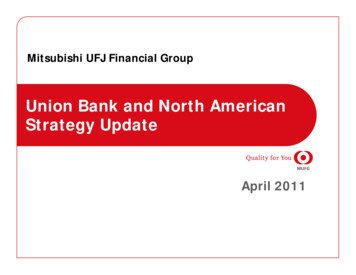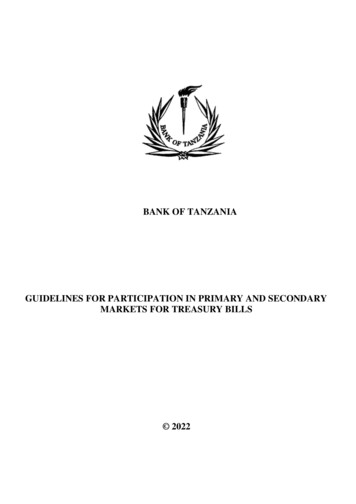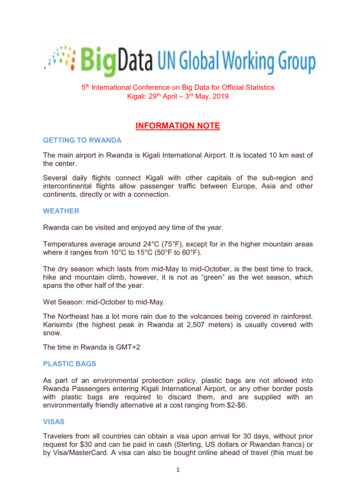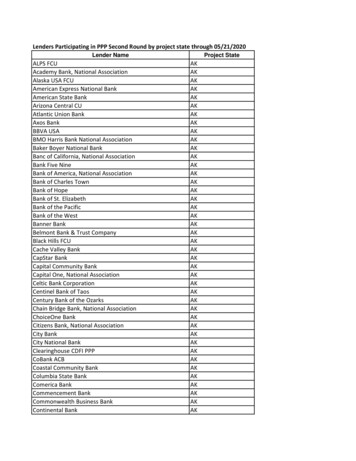
Transcription
Bank De-Risking of Non-ProfitClientsA Business and Human Rights PerspectiveNYU Paris EU Public Interest Clinic06/01/2021
AcknowledgementsWe would like to thank Lamin Khadar (Global Adjunct Professor of Law, NYU Paris), Margaux Merelle (ResearchAssistant, NYU Paris EU Clinic), as well as the NYU students Jason Warrington, Nora Niazian and Trent Pacer forlending their expertise to this paper, and co-writing it. Thanks to Ruben Zandvliet of ABN AMRO and ThaliaMalmberg of Human Security Collective, who provided input to this paper. We would also like to thank the manyreaders who have also added their knowledge to this paper, including Bart van Kreel (ABN AMRO), Lia vanBroekhoven, Fulco van Deventer and Sangeeta Goswami (Human Security Collective), Lucas Roorda (UtrechtUniversity), Rich Stazinski and Sam Jones (Heartland Initiative) and Ashleigh Owens (Shift).This Report should be cited as: NYU Paris EU Public Interest Clinic, Bank De-Risking of Non-Profit Clients (2021). NYU Paris Public Interest ClinicBank De-Risking of Non-Profit ClientsJune 20212
“Bank De-Risking of Non-Profit Clients: A Business and Human Rights Perspective is a welcomed and much-neededcontribution to better understand the human rights risks associated with financial institutions' decisions to de-riskNPOs. Over several years, much of the policy debate has focused on the effects of de-risking on NPOs, especiallyhumanitarian organizations delivering vital assistance to populations in need, but there has been scant guidancefor banks as to how they can balance regulatory requirements and their responsibility to respect human rightsunder the UN Guiding Principles. This is an important resource for banks and NPOs to help avoid de-risking.”- Sue Eckert, Senior Adviser, International Peace and Lecturer at the Jackson Institute for Global Affairs, YaleUniversity“This report is very welcome. Civil society organizations (or Non-Profit Organizations - NPOs) need access tobanking services like any other company or individual does. The overwhelming vast majority of NPOs engage inlegitimate activities for the protection of human rights, the betterment of society, the environment and otherworthy causes; those who use an NPO ‘façade’ to engage in illegitimate activities should be stamped out withoutaffecting the whole NPO community. In recent years, the space for NPOs to operate freely and safely has beensignificantly restricted and limited, and society as a whole is all the poorer as a result. CIVICUS 2020 global reportsays that 87% of the world's population now live in countries rated as ‘closed’, ‘repressed’ or ‘obstructed’. Hencenow more than ever NPOs need support to be able to continue their vital work unrestricted by political, arbitraryor inadvertently draconian measures, and banks have a responsibility, as well as an important role to play toensure this is the case. As the report says, de-risking is a human rights issue and NPOs have human rights.”- Mauricio Lazala, Deputy Director & Head of Europe Office, Business & Human Rights Resource Centre"This report is a crucial tool for businesses seeking to better understand the importance of NGOs having access tobanking services in order to conduct their work effectively. NGOs being targeted by policies that disrupt theirability to conduct their activities is bad for business. Companies focused on long-term sustainability recognizethat a strong and vibrant civil society sector is a key part of a healthy foundation for building sustainable, inclusiveeconomies and well-functioning democracies."- Annabel Lee Hogg, Senior Manager, Governance & Human Rights, The B TeamBank De-Risking of Non-Profit ClientsJune 20213
Contents—Bank De-Risking of Non-Profit Clients. 1Contents . 41. Introduction . 52. What is a Non-Profit Organization and what do they do? . 63. De-risking of NPOs . 73.1 Forms of de-risking . 73.2 Root causes of de-risking . 93.3 Effect of de-risking on the work of NPOs . 134. De-risking as a human rights issue . 154.1 Impact on the human rights of NPO beneficiaries . 154.2 Direct human rights impacts of de-risking on the NPOs . 154.3 De-risking as a business and human rights issue . 185. Practical actions for dealing with NPO clients and avoiding de-risking . 215.1 Embedding de-risking in human rights policies and due diligence processes . 215.2 Stakeholder engagement . 225.3 Alignment with compliance policies and guidance documentation . 235.4 Internal learning and cross-functional co-operation . 245.5 External communications and capacity building . 245.6 Fee differentiation and service models . 255.7 Addressing the remedy gap . 256. Resources . 27Bank De-Risking of Non-Profit ClientsJune 20214
1. Introduction—This report has been prepared by the European Public Interest Law Clinic of New York University LawSchool in Paris, in cooperation with Human Security Collective (HSC), ABN AMRO and DentonsNetherlands. It aims to raise awareness amongst banks about the human rights impacts of de-risking ofNon-Profit Organization (NPO) clients. In many ways, banks do not treat NPO clients differently frombusiness enterprises. As the UK Financial Conduct Authority has suggested, “the decision to accept ormaintain a business relationship is ultimately a commercial one for the bank.”1 However, in the wake ofstricter anti-money laundering and counter-terrorism financing (AML/CTF) legislation, NPOs havesuffered disproportionate restrictions on access to financial services. In some cases, governmentsdeliberately impose restrictions on the ability of NPOs to solicit, receive and utilize financial resources.2This report explores decisions made by banks that lead to de-risking. It is based on the premise thatbanks’ discretion to de-risk NPOs is limited, and should be guided by their responsibility to respecthuman rights under the United Nations Guiding Principles on Business and Human Rights (UNGPs) andthe OECD Guidelines for Multinational Enterprises.3 Although many banks recognize the UNGPs and theOECD Guidelines as authoritative normative frameworks, implementation has focused mostly on humanrights risks that banks are exposed to via their corporate lending, project finance and asset managementactivities.4 Better understanding of the human rights risks associated with banks’ own operations, thedomain in which they may cause instead of contribute, or be directly linked to adverse impacts onhuman rights, is important for those institutions that aspire to fully implement the UNGPs and OECDGuidelines. The announcement of the European Commission to introduce mandatory due diligencelegislation in 2021 makes those efforts even more pertinent.This report explains the forms, root causes and consequences of de-risking, the relevant human rightsnorms and practical actions to allow banks to manage perceived risks of their NPO clients whilstrespecting human rights.5 It is intended for a broad audience of banking staff. We hope that it will serveas the basis for cross-functional cooperation within banks to better facilitate access to financial servicesfor NPOs. If you have feedback on this report, or good practices that you would like to share, pleasesend an email to info@hscollective.org.1Human Security Collective and European Center for Non-For-Profit Law, “At the Intersection of Security and Regulation: Understanding theDrivers of ‘De-Risking’ and the Impact on Civil Society Organizations” 2018, p 19.2 UN Special Rapporteur on the rights to freedom of peaceful assembly and of association, pp 17-18, A 70 266 ENG.pdf, A/70/266.3The human rights chapter in the OECD Guidelines is aligned with the UNGPs.4 See for example: OECD, “Due Diligence for Responsible Corporate Lending and Securities Underwriting: Key considerations for banksimplementing the OECD Guidelines for Multinational Enterprises” 2019.5 FATF, “FATF clarifies risk-based approach: case-by-case, not wholesale de-risking” 23 October tions/documents/rba-and-de-risking.html.Bank De-Risking of Non-Profit ClientsJune 20215
2. What is a Non-Profit Organization and whatdo they do?—Non-Profit Organizations, sometimes also referred to as “Civil Society Organizations” or “CharitableOrganizations”, are associations of people, organized on a not-for-profit and/or voluntary basis. Peoplemay associate informally or formally, offline or online, locally, nationally or internationally. Once peoplehave associated formally within an NPO (by incorporating a legal entity), then the NPO itself has rightsand responsibilities, just like a company does. NPOs also make use of banking services, just likecompanies do, to receive funds and disperse them in the course daily operations.NPOs can be large or small and can have formal employees or rely exclusively on volunteers. Some NPOsmay secure their funding entirely through donations from the public, while others may rely on fundingfrom governments, private foundations or even companies, as well as a combination of these sources.NPOs may be active in different fields and have different values or missions, for example, related tosports, politics, poverty reduction, international human rights, environmental protection etc.NPOs are independent actors with mandates and missions to serve society in its broadest sense, butmay also have a narrower mandate by issue, geography, stakeholder, etc. They do this by, for example,holding governments and businesses to account or representing the interests of disadvantaged groupsof people. They could carry out these activities by engaging in public advocacy campaigns; participatingin the policy and lawmaking process; raising money for those in need; or providing important services tothe disadvantaged.Bank De-Risking of Non-Profit ClientsJune 20216
3. De-risking of NPOs—3.1 Forms of de-riskingBanks provide vital financial services to NPOs across the world. However, many NPOs struggle to obtainaccess to banking services because of de-risking. De-risking refers to various internal banking practicesthat may impose significant hurdles for NPOs’ ability to access financial services.6 Throughout thefinancial sector, the practice of de-risking NPO clients has increased in recent years. The “risk” in “derisking” usually refers to the bank’s concern that the customer poses a risk for money laundering orterrorism financing, or that processing transactions for them might entail a breach of sanctionsregulations.There are varying distinctions in the definition of de-risking that are worth pointing out for the purposeof clarity. De-risking may, for some in the banking sector, be defined as fully justified steps taken by thebank to decrease the risk its services are abused for criminal activities, which they are required to do bylaw. For the purposes of this report, we will use the definition by the Financial Action Task Force (FATF),7which defines de-risking as the phenomenon of financial institutions terminating or restricting businessrelationships with clients or categories of clients to avoid, rather than manage, risk in line with theFATF’s risk-based approach.8 Similarly, the U.S. government defines de-risking as “instances in which afinancial institution seeks to avoid perceived regulatory risk by indiscriminately terminating, restricting,or denying services to broad classes of clients, without case-by-case analysis or consideration ofmitigation options.”9 This definition of de-risking looks at specific acts by banks that are deemedoverzealous, unnecessary, disproportionate or even discriminatory. With this said, it is important toemphasize that there may be justified reasons for banks to terminate or restrict services to certainclients, and that the difference between what is a justified limitation of services and what is de-riskingmay at times be difficult to distinguish. This report does not aim to engage in a discussion overdefinitions. Rather, it urges banks to examine questions around access to financial services for NPOsthrough a human rights lens. This perspective—which is focused on risk to people—complements, anddoes not replace, the compliance perspective that focuses on risk to the bank and the integrity of thefinancial system.6Chatham House, “Humanitarian Action and Non-state Armed Groups: The Impact of Banking Restrictions on UK NGOs” 28 April estrictions-uk-ngos#introduction.7 The FATF is the recognized global standard setter, seeking to combat money laundering, terrorism financing and other threats to theinternational financial system.8 FATF, “FATF clarifies risk-based approach: case-by-case, not wholesale de-risking” 2014, nd-de-risking.html.9 Remarks by Acting Under Secretary Adam Szubin at the ABA/ABA Money Laundering Enforcement Conference, 16 November eleases/Pages/jl0275.aspx.Bank De-Risking of Non-Profit ClientsJune 20217
While NPOs are active all around the world, many NPOs are active in parts of the world where peopleare in need of aid. Often, their activities take them to countries that banks classify as high-risk, whichmeans the bank must perform enhanced due diligence to prevent money laundering or the financing ofterrorist activities. Due diligence in this context, simply means the act of performing background checkson a potential customer to ensure they do not pose an excessive risk to the bank.10 Although theseKnow Your Customer (KYC) procedures are no different from those carried out for corporate clientsactive in high-risk countries, NPOs are believed to be more often affected by de-risking. Financialinstitutions that are committed to respecting human rights should be sure that they are not merelyavoiding, rather than managing, perceived risks.11De-risking comes in different shapes and sizes, and can occur before, during or at the end of acontractual relationship between the bank and the NPO. The table below provides some illustrativeexamples of de-risking as experienced by NPOs.12On requesting to open a bankaccount Disproportionatelyburdensome due diligencerequests, especially where theNPO is very small and may nothave resources to effectivelycomply with due diligencerequests or where this isintended to discourage theprospective client Based on insufficient or genericdue diligence on the part ofthe bank, such as refusing toopen a bank account based ongeneric information (e.g. thecountries where the NPOoperates) or unverifiedinformation (e.g. unverifiedinformation about the NPOprovided to the bank by a thirdparty)Once a bank account has beenopenedEnding the banking relationship Delaying or blocking thetransfer of funds, especiallywhere the funds are beingtransferred to conflict-affectedareas and high-risk countries Closure of bank accounts,especially where the bankingrelationship is terminatedwithout explanation orpossibility to file a complaint Refusing to providedocumentation or explanationwhen delaying or blocking thetransfer of funds Termination of scheduled ordelayed transfers, especiallywhere the bank returnsaccepted funds to the donorafter the NPO client hasalready spent the money Freezing of existing bankaccounts Restricting access to bankingservices (e.g. refusing to openadditional accounts or provideaccess to credit to existing NPOclients) Increased or inconsistent duediligence requirements10This is different from human rights due diligence, which is a responsibility on banks under the UNGPs.FATF, “FATF clarifies risk-based approach: case-by-case, not wholesale de-risking” 23 October tions/documents/rba-and-de-risking.html.12 As evidenced by, among others: Sue Eckert et al, “Financial access for US Nonprofits” Charity and Security Network, February 2017, p ccessreport/.11Bank De-Risking of Non-Profit ClientsJune 20218
3.2 Root causes of de-riskingThere is no straightforward answer to the questions of why banks engage in de-risking. The followingfour (interrelated) root causes are at the heart of the problem. This list also shows that while this paperaddresses the responsibility of banks to minimize unnecessary de-risking, they are not the only relevantactors. Governments, financial sector regulators and NPOs themselves also have an important role toplay.Complex and multilayered regulationThis report does not intend to provide a comprehensive description of applicable AML/CFT laws andregulations. The sheer size and complexity of AML/CFT regulating bodies and applicable norms andrequirements make navigating the associated risks a complicated task for banks and NPO’s alike.In general, it may be observed that financial regulators and supervisors all around the world arebecoming more forceful on CFT and AML compliance by financial institutions (banks) and other sectorssuch as NPOs. The Financial Action Task Force (FATF) is arguably one of the most impactful. It is therecognized global standard setter, seeking to combat money laundering, terrorism financing and otherthreats to the international financial system. It is both a policymaking and an enforcement body. Almostall countries across the world endorse its 40 Recommendations ('the standards'). The FATF works on theassumption that if countries effectively implement their standards, financial systems and the broadereconomy will be protected from money laundering, terrorism financing, proliferation financing andother threats with direct links to the financial sector. Other relevant policymaking bodies include the UNSecurity Council, the European Union, US Treasury and national governments. This regulatory regime is,in turn, internalized by the financial services sector. Banks and money transfer agencies are required tocarry out extensive due diligence on their customers to fulfil compliance requirements and face largefines and/or untold reputational damage if they are found to be in contravention of any of theseregulations.Bank De-Risking of Non-Profit ClientsJune 20219
Engagement between the FATF and the Global NPO Coalition on the FATF has, to a large extent, along with the backing of anumber of ‘civil society friendly governments’, ensured that the FATF takes serious note of the negative effects of itsstandards on the financial and operational space of civil society. This has resulted in the revision of Recommendation 8 in2016 to change the designation of NPOs as being “particularly vulnerable to terrorism financing”, and an emphasis on theRisk-Based Approach, amongst others. In 2021, the FATF Secretariat also announced it was beginning a new work stream onthe unintended consequences of poorly implemented AML/CFT measures – from financial exclusion to the abuse of counterterrorism measures to suppress civil society.The FATF emphasises in its Guidance for Terrorism Financing (TF) Risk Assessment, to which Global NPO Coalition memberscontributed, that countries need to understand the residual or net risk for TF abuse of NPOs. The guidance encouragesgovernments not to view NPOs as inherently at risk for TF abuse but to value and validate financial and administrativemeasures already taken by NPOs to prevent risk. The Taskforce underscores what NPOs have been stressing all along: thatzero risk related to work in and on conflicts, human rights issues and humanitarian crises does not exist.1 In this regard, theissue of de-risking becomes of importance to both government, banks and donors, whose support to NPOs is predicated onthe support of vulnerable populations affected by humanitarian crises, and groups and individuals whose rights are beingviolated by those in power.Sanctions regimes are an additional factor. Banks also need to take heed of international and domesticsanctions lists, to ensure they are not in breach of those when they are taking on a client or processing apayment. Sanctions can be imposed by the UN Security Council, the European Union and individualstates. An influential player in the global sanctions architecture is the United States’ Treasury’s Office ofForeign Asset Control (OFAC) which issues and enforces US Sanctions. As a large majority ofinternational trade is conducted through the US dollar, and these transactions often require a US - basedcorrespondent bank for the transfer to occur (even between two non-US parties). Those correspondentbanks fall under US Treasury jurisdiction and all transactions that pass through them, even if it is not theend destination, comes under the OFAC jurisdiction and must be blocked if they are in violation of OFACSanctions.13 The importance of the US dollar internationally – and the fear other banks may have oflosing access to risk-averse US correspondent banks and potentially violating OFAC’s material supportprovisions – means that most major financial institutions around the globe integrate compliance withOFAC in their due diligence work, even in transactions in which there is absolutely no connection to USdollars, US persons, or US jurisdiction.1413The Office of Foreign Assets Control (OFAC) of the US Department of the Treasury administers and enforces economic and trade sanctionsbased on US foreign policy and national security goals against targeted foreign countries and regimes, terrorists, international narcoticstraffickers, those engaged in activities related to the proliferation of weapons of mass destruction, and other threats to the national security,foreign policy or economy of the United States.14 Adam Smith, “Dissecting the Executive Order on Int’l Criminal Court Sanctions: Scope, Effectiveness, and Tradeoffs” 15 June ons-scope-effectiveness-and-tradeoffs/.Bank De-Risking of Non-Profit ClientsJune 202110
Business profile of NPO clients and the ‘right’ to a bank accountThe business profile of NPO clients may vary enormously. Some are small and have checking accountsonly, while others may hold large asset portfolios. As such, there is often no single service model thatbanks offer. When the (expected) cost of compliance (i.e., the cost of the know your customer (KYC) duediligence that a bank must perform) outweighs revenues the bank could decide not to accept the NPO asa client, or to terminate the relationship. Under EU law, every “consumer” legally resident in the EU hasa right to an account with basic features (Directive 2014/92/EU, Chapter IV). However, under theDirective, “consumers” are defined as “natural persons” who are acting for “purposes which are outsidetheir trade, business, craft or profession”, thus excluding NPOs (i.e. legal entities).Under the principle of freedom of contract and the terms of the banking services contract, in mostcountries financial institutions will have the right to terminate the contract under certain circumstancesgiven prior notice. Indeed, in the context of de-risking, the UK Financial Conduct Authority hassuggested, “the decision to accept or maintain a business relationship is ultimately a commercial one forthe bank”.15 Moreover, most banking services contracts will have provisions specifically allowing fortermination where necessary to comply with anti-money laundering and counter-terrorism financing(AML/CTF) regulations.However, in the Netherlands a handful of organizations have been successful in bringing claims againstbanks following de-risking decisions.16 Dutch courts take the view that consumers (including NPOs) havea general interest in access to banking services and that due to the special position of banks (as serviceproviders) in that regard, in the interests of fairness, a greater level of protection should be given to theconsumer. The courts have held that the consumer’s interest in having access to the financial systemand to use banking services outweighed the bank’s interest to safeguard its integrity by strictly applyinganti-money laundering and terrorism financing law and the de-risking decisions must be taken on a caseby-case basis following a careful consideration of the relevant facts.1715Human Security Collective and European Center for Non-For-Profit Law, “At the Intersection of Security and Regulation: Understanding theDrivers of ‘De-Risking’ and the Impact on Civil Society Organizations” 2018, p 19.16 See 22 December 2015, Court of appeals in Amsterdam (appeal preliminary relief proceedings), ECLI:NL:GHAMS:2015:5323 (Hells Angels MCFoundation (Hells Angels)/ABN AMRO BANK N.V. (ABN AMRO)); 19 January 2018, Supreme Court of the Netherlands, ECLI:NL:GHAMS:2018:281(Yin Yang c.s. (Yin Yang)/ING Bank N.V.(ING Bank)); and 4 November 2019, the court of Amsterdam, ECLI:NL:RBAMS:2019:8144, (Project C HoldingB.V. (Project C)/ABN AMRO Bank N.V. (ABN AMRO Bank)).17See id. (Hells Angels/ABN AMRO BANK).Bank De-Risking of Non-Profit ClientsJune 202111
Knowledge and capacity at the bankLarger NPO clients may have a relationship manager who can be contacted about questions oncomplicated issues, like transactions to a conflict area in which the NPO is doing humanitarian work.Typically, these relationship managers have a larger portfolio of NPOs, which means that they haveprofound knowledge of the Non-Profit Sector. They may also have close connections with importantstakeholders in the field, such as industry associations or large donors (including the Ministry of ForeignAffairs). Relationship managers’ expertise helps the bank to better understand and assess risks in orderto have an efficient KYC process and, vice versa, they can advise their clients on actions they can take tomitigate risks.When this level of expertise is lacking, the odds of de-risking increases. The KYC-process for small NPOsis typically handled by staff without specific sectoral knowledge. Organizations without a relationshipmanager also have less of an opportunity to build trust and rapport with the bank and are put in theposition where they have to constantly re-introduce themselves to the attending KYC-officer. Issues thata specialized relationship manager would find perfectly normal may be more easily flagged as ‘risks’,such as assets originating from major donors. Real risks may be more easily deemed unacceptable,whereas a specialized relationship manager would know how to mitigate the risk and communicate thisto the NPO as a condition to maintaining or starting the client relationship. And mistakes are easilymade, for example when an NPO is refused a bank account because a board member is the national of a‘sanctioned’ country, although the imposed sanctions only target a handful of political leaders. Banks’sanctions desks will be well-aware of this nuance, but less specialized KYC-officers may not be. NPOclients with more, or more serious risk indicators would typically be subjected to more frequentscreening. This significantly raises the cost of compliance, which in turn increases the chance that a NPOis refused banking services on commercial grounds.Knowledge and capacity at the NPOLack of expertise may also be an issue on the side of the NPO. For example, NPOs may not be aware thatAML/CTF regulations that banks must comply with have such a large impact on their onboardingprocess. While it may appear simple to open a bank account, the KYC process for new clients may betime consuming. The bank may ask all kinds of questions to obtain a level of comfort concerning the riskprofile of a new NPO client, which may seem excessively burdensome, but is actually standard practice.This could lead to frustration on the side of the NPO, and critical questions on why the bank needscertain documents. In turn, this feeds the suspicions of the KYC-officer that the NPO is not cooperativeand ‘must be hiding something’.Bank De-Risking of Non-Profit ClientsJune 202112
Deliberate misinformation campaignsThere is growing concern that NPO’s are vulnerab
This report has been prepared by the European Public Interest Law Clinic of New York University Law School in Paris, in cooperation with Human Security Collective (HSC), ABN AMRO and Dentons Netherlands. It aims to raise awareness amongst banks about the human rights impacts of de-risking of Non-Profit Organization (NPO) clients.
